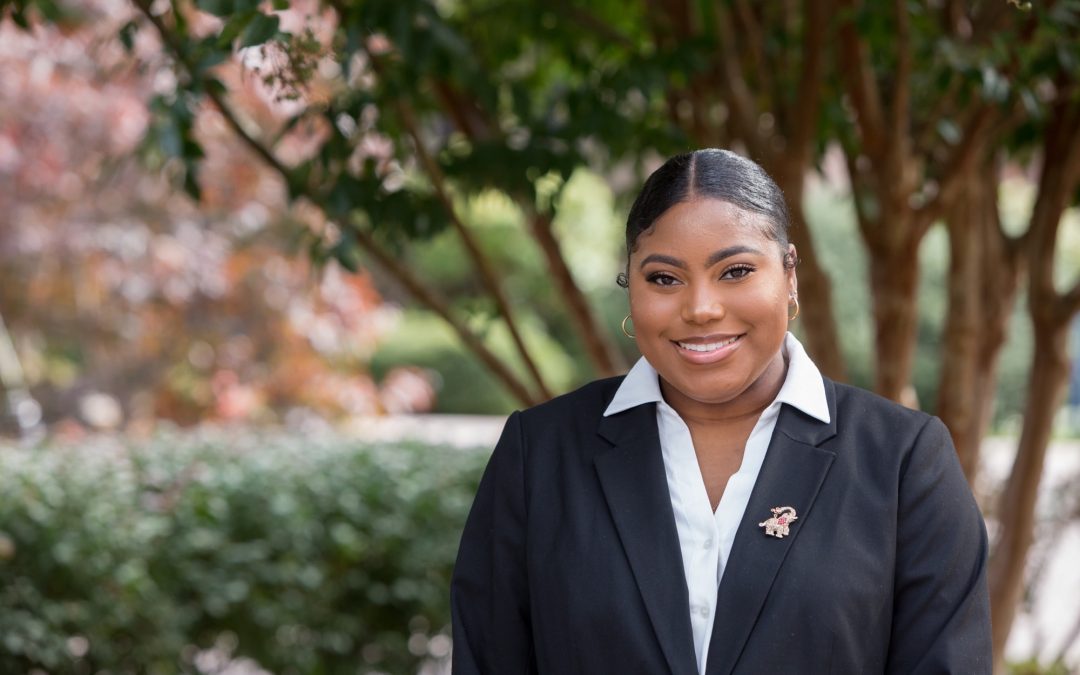
by Alondra Duncan-Belford | Mar 2, 2022 | Internship Experiences, Undergraduate Students
From the age of 16, as I reflected on how I wanted to serve others and the greater world, I knew that I wanted to work within human rights and hunger. My current internship for the U.S. State Department at the U.S. Mission to the United Nations has allowed me to explore this passion within developing nations. Daily, I assist diplomats with planning various events and notetaking during meetings, both of which help strengthen my writing and analytical skills. Previous events I have attended have covered topics such as food waste, taxation, sustainable development, and poverty. Recently, I was able to work with a U.S. ambassador on an upcoming human rights project, which has allowed me to work closely with more senior officials. It has been wonderful to expand my knowledge in different areas, such as hearing about climate change from different delegates during events and negotiations. This includes working with documents that are used within the Economic and Social Council (ECOSOC), learning the office language and acronyms, enhancing writing skills concisely through brief event summaries, and utilizing networking skills within my department. As this internship is virtual, working from home can be challenging, but it has been very rewarding knowing that we are appreciated for all the assistance that we provide. My biggest achievement thus far has been assisting an ambassador with research and a speech presentation on a subject area that I am passionate about.
What I really value from my internship is that I am given the opportunity to meet with ambassadors, diplomats, and other senior officials weekly to inquire and receive advice about their careers. Maintaining professionalism is crucial during this internship as we are constantly communicating with other U.S. State Department officials and UN employees of all fields and levels. For example, I had the opportunity to meet with U.S. Ambassador to the UN this week. Hearing her story and passion motivated me as a Black woman to join this field in the quest of breaking barriers and pursuing my dreams. My diplomacy coursework has equipped me with the background knowledge needed to understand the conversations taking place and has assisted me in transferring the skills I have learned in the classroom to the workplace.
Every day, I remember that I am 20 years old, an undergraduate student, and one of the youngest interns in my department. I am extremely grateful to be doing what I do and attribute this success to the School of Diplomacy and the assistance of Dr. Ruby. As a female student of color, I enjoy seeing representation within the State Department, and it assures me that I belong here. The people that I work with are extremely kind and willing to share advice with us about their professional careers, proving how effective networking will continue to be in any positions that you obtain.
I highly recommend this internship to anyone that is interested in the work of the State Department and the United Nations, as it has been the best of both worlds for me. I have learned so much during the time that I have spent there and am extremely eager to see all that is to come!
-Akaysha Palmer ’22
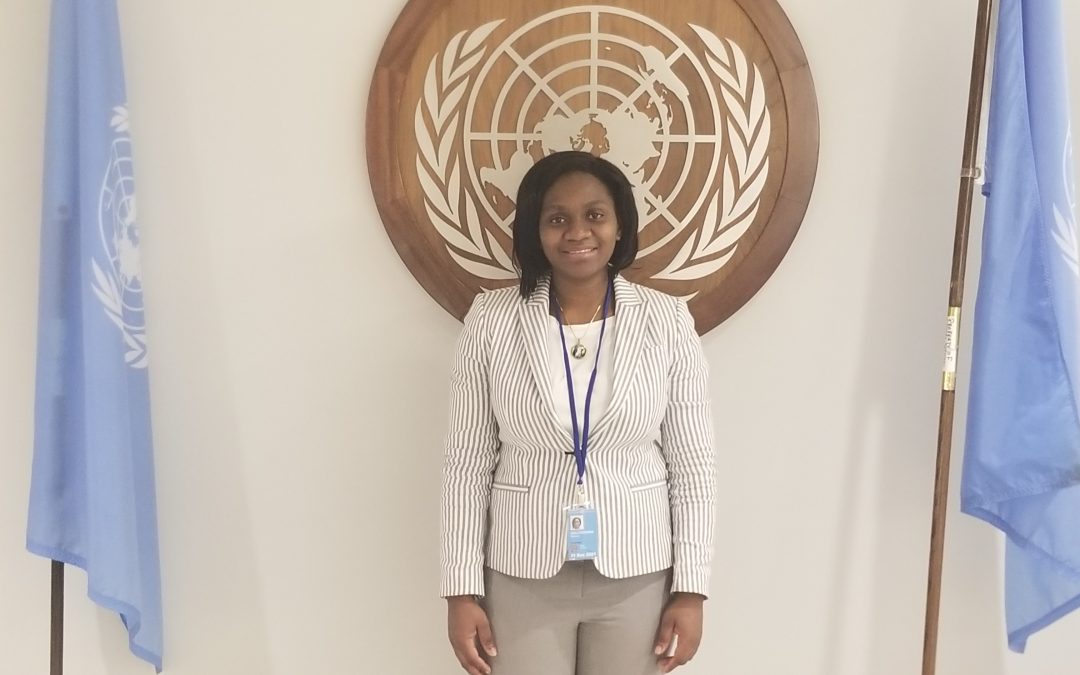
by Alondra Duncan-Belford | Jan 27, 2022 | Graduate Students, Internship Experiences
My name is Onyinye Bridget Ogili-Foreman and I am a second-year graduate student at The School of Diplomacy and International Relations. I worked as a Civil Affairs Officer intern at the United Nations Department of Peacekeeping Operations (UNDPKO) at the UN Headquarters in New York City. I always aspired to work with the UN because I have a passion for its duties, especially in areas of international security and peacekeeping in high-conflict regions. I became especially interested in the UN after taking courses that exposed me to the workings of the UN and its inherent role in international affairs.
My responsibilities included providing research assistance for policy documents and evaluating reports involving the work of different missions in the field. I also had the opportunity to work with U.N. experts to actually create policy documents. These documents will later be used in the policy prescriptions related to U.N. peacekeeping.
My internship is directly related to my coursework at the School of Diplomacy through the goals of the U.N. The goal of the U.N. is to promote diplomatic engagements between countries and create opportunities for them to find common ground on many issues that benefit from multilateral efforts. Many of the assignments I was given at the internship came naturally to me due to my previous coursework. Learning theories regarding international security and the roles of international organizations gave me material knowledge on most of the work and activities that I had the opportunity to engage in. I gained firsthand experience on how policy documents are drafted, as well as the consultation and negotiation processes needed, all of which sharpened my research, writing and analytical skills.
This internship reinforced my ambition to pursue a career with the UN and other opportunities linked to international security both in the private and public sector. My initial challenge was adjusting to work with a group of expert professionals who are more advanced both in education and experience, but I quickly learned to be humble and to ask questions. One of the most rewarding experiences was interacting with different stakeholders where I learned the nitty-gritty of the peacekeeping work. My greatest achievement has been helping to complete the work that would improve protection and safety of civilians in conflict. The satisfaction of knowing that the guidance we developed could be saving lives is truly refreshing.
My biggest take away from this internship is learning how to work with others, how to treat and respect people’s opinions and to seek to listen more. I believe these skills are going to be incredibly useful for me as a future diplomat that will be interacting with people of diverse backgrounds. I certainly recommend this internship for my fellow students as it will broaden your horizon and positively impact your personality.
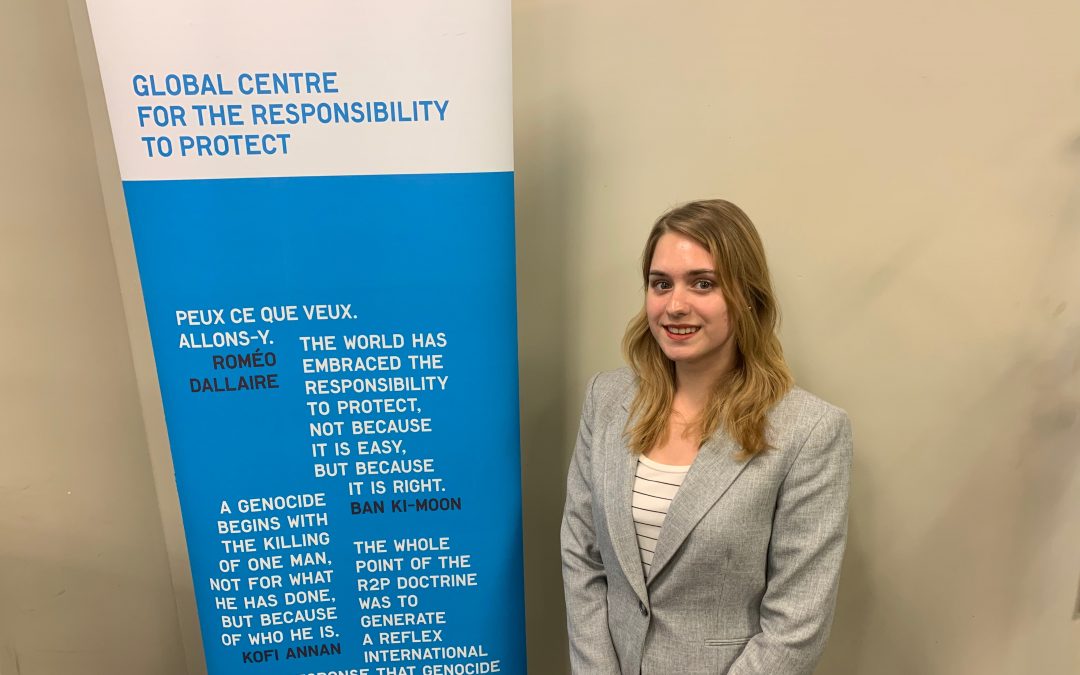
by Madison McHugh | Dec 10, 2019 | Internship Experiences, Undergraduate Students
My name is Stephanie Miller. I am a senior undergraduate student in the Diplomacy and International Relations program with a secondary major in Religious Studies and a minor in Arabic. I completed a research internship at the Global Centre for the Responsibility to Protect in Manhattan, New York.
The Global Centre is a research and advocacy organization that specializes in war crimes, genocide, ethnic crimes, and crimes against humanity. It works with governments, regional bodies, and other NGOs to operationalize the principles of the Responsibility to Protect doctrine into policy frameworks. It also monitors over 20 country situations either at risk or currently committing mass atrocities. As independent institutions, non-profits like the Global Centre are instrumental in ensuring accountability and encouraging inter-governmental action to prevent mass atrocity, and I had a wonderful time working with them.
My decision to pursue this internship was based in curiosity. Mass atrocities are crimes that make international headlines every day, but the corresponding prevention agenda is not something that people usually recognize, even in the classroom. The Global Centre works to bridge the gap between policy and responsible action, calling for the international community to commit to the principles outlined by the Geneva Convention and honor their agreements to protect civilians across the globe. I learned that while this work is not glamorous, it is entirely necessary.
Interning at the Global Centre taught me the difference between humanitarian work and human rights advocacy, cultivating a newfound interest in both. Prior to this internship, I thought that the two terms were mutually interchangeable, and I found that this a common misconception often overlooked. This experience taught me new and transferable skills that are applicable to both fields, honing practical expertise in report writing and analysis, oral communication, conflict mediation, and public engagement. I don’t think I could have found a more supportive and encouraging environment as I developed these new skills, and I look forward to carrying them into my career.
One of the challenges I faced in the beginning of my internship was separating myself from my work. The subject material I was dealing in daily was sometimes difficult to process, and in order to succeed in the position, I had to learn how to leave work in the office rather than take it home with me. I began setting healthy boundaries for myself before I could devote my time and energy to a mission that I quickly grew to care about. This internship taught me more than just practical skills – it taught me a life lesson that many don’t learn until much later, and for this I will always be grateful.
My advice to students looking for internships is to not limit yourself to searching only in the field you are interested in. Diversifying your interests enables you to take advantage of opportunities that you may not have had otherwise. My career goals were vastly different going into this internship than they are now. Working at the Global Centre made me re-evaluate my priorities and consider what I really want to do with my degree after I graduate, which is something I do not think I would have been forced to reckon with if I had worked anywhere else. Internships do not always change your outlook on life, but mine did. I gained new skills, new interests, and a new perspective on the field I want to go into.
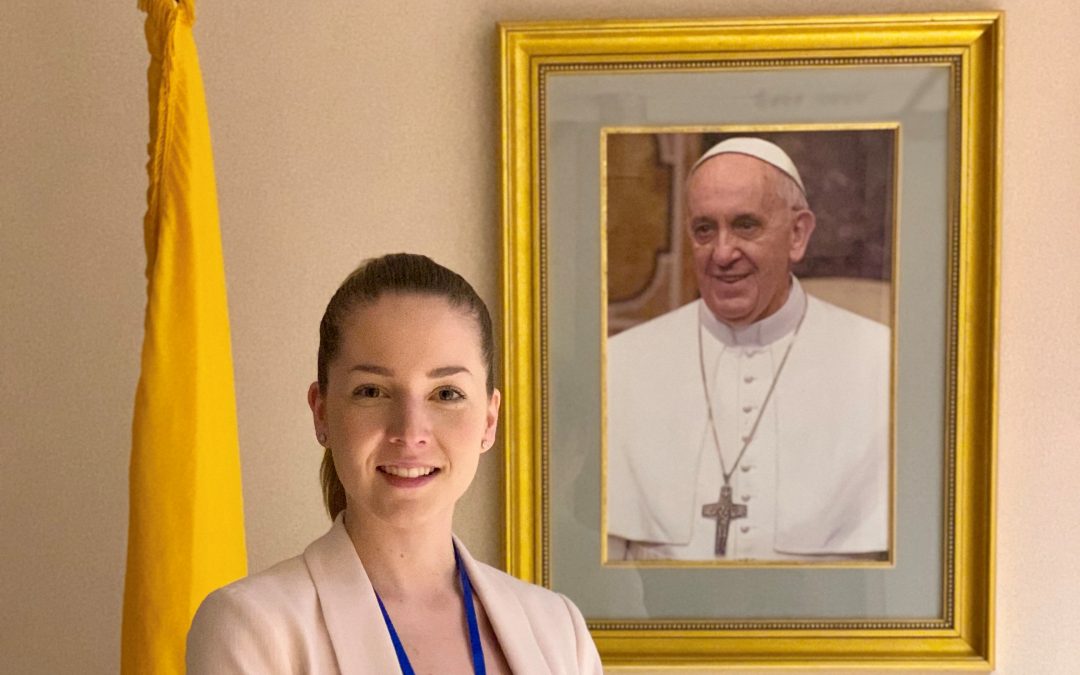
by Madison McHugh | May 29, 2019 | Graduate Students, Internship Experiences
My name is Roxane Heidrich. I am a second-year graduate student in the Diplomacy and International Relations Program, specializing in Global Negotiations and Conflict Management and International Security. I completed an internship at the Permanent Observer Mission of the Holy See to the United Nations in New York.
My goal upon graduation is to work in the field of mediation of international conflicts and facilitate dialogue between stakeholders. These conflicts also possess a security dimension prior to peace talks, and I was interested in learning what arrangements need to be present on the ground before one can begin the mediation process. The Holy See matched these interests of mine in their dedication to peace and reconciliation as a religious organization. Such organizations are often at the forefront of mediation efforts, brokering ceasefires and peace agreements and playing a major role in bringing together rival parties and negotiating a successful and lasting peace.
In this sense, my decision to pursue this internship followed my understanding of mediation as an activity that needs to be carried out with the principles of neutrality, genuine engagement, and the unbiased interest of the mediator to help the parties find the best possible solution. I learned that the Catholic Church brings this to the table and more, which is linked to people’s connection through faith and a number of principles that call for mutual understanding and using non-violent means for solving violent crisis.
In my position, I learned much about the principles that guide the work of the Holy See in peacebuilding across the world. More specifically, through attending meetings at the Security Council (where the Holy See is an Observer State), I learned about such security arrangements that are fundamental to the cessation of the hostilities – a step that comes before the deployment of other types of efforts such as mediation and post-conflict reconstruction. I learned even more about UN strategies for peacekeeping and peacebuilding, including the challenges to such efforts which are very often represented by the political disagreement between Member States.
From this internship, I learned many new and transferable skills, such as writing reports in an accurate and timely fashion, speaking about and analyzing current security issues in a critical way, understanding the context of current conflicts such as in Venezuela, Kosovo, Myanmar, and Palestine-Israel, and understanding the timing of UN interventions (peacekeeping, appointment of special envoys, establishment of sanctions, establishment and withdrawal of missions, and mediation/dialogue facilitation) depending on the timing and severity of the conflict and the compliance of the host countries. These new skills represent some of my greatest accomplishments, and I am excited to carry them forward in my career.
Some challenges included coordinating my internship responsibilities with coursework and commuting between South Orange and New York, which could be difficult at times when weather was bad. Overall, however, I would definitely recommend this internship to someone that has a solid grasp of the principles of Catholic Social Teaching and the flexibility to work in a very dynamic environment. The opportunities to learn a lot and to grow professionally are numerous, and I am very grateful for my experience.
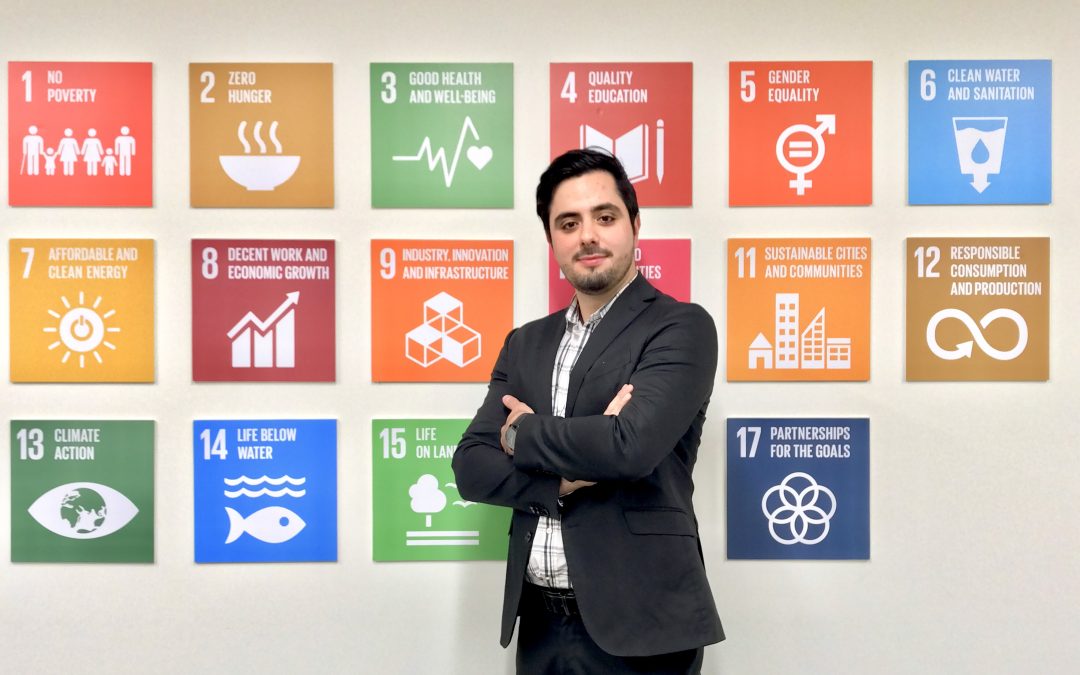
by Madison McHugh | May 18, 2018 | Internship Experiences, Undergraduate Students
My name is Ahmet Yoruklu, and I am a senior studying Diplomacy and International Relations with a double major in Economics and a minor in Russian. I am currently interning at the world’s largest corporate sustainability initiative, the United Nations Global Compact, whose mission is to mobilize a global movement of sustainable companies and stakeholders to create the world we want. Since I have been interested in multi-stakeholder collaboration between the private and non-business sector for development and sustainability across the world, I can’t think of a better fit for my personal development in this space.
As I work on the Client Engagement team here at the UN Global Compact, I get to interact with our business participants on various topics; from communication on annual progress reports to post-event follow-up campaigns. In addition, I conduct rigorous research on prospective participants and assist my supervisor in executing recruitment procedures efficiently.
What I enjoy the most about my internship is that I have the privilege of learning about the world’s largest companies and MNC’s as part of my work. It is an outstanding experience to witness how businesses align their operations and business strategies with global goals for a more sustainable world. Moreover, the opportunity to attend flagship events on different themes, such as the Commission on the Status of Women as well as the SDG Business Forum during my internship period at the UN Headquarters is certainly an invaluable experience.
When it comes to my studies at Seton Hall, what I do here on the Client Engagement team is very much related to Diplomacy and International Relations as well as Economics. Since we are a multi-stakeholder organization, we communicate with numerous entities from all over the world which requires a certain knowledge of diplomatic language and cultural awareness. In terms of diplomacy, I am certainly reaping the rewards of what I have learned studying diplomacy as I execute on my tasks, whether writing a report or utilizing critical and rational approaches during decision-making processes. Combining my knowledge of diplomacy with economics has created the best foundation for me to understand why for-profit entities take certain actions in the global economy and how I can come up with innovative ideas and solutions to achieve our agenda at the UN Global Compact. Both diplomacy and economics prepared me to be more resourceful when it comes to communicating with private sector companies and engaging them with our organization.
As I gain new experiences with this internship, it has helped me become more realistic about my career goals in terms of what path to follow in the near future. Through the experiences I add to my skillset, such as CRM management, strategic partnerships, and corporate communications, I am becoming more prepared than ever to pursue my goals in the sustainability space.
I would definitely recommend this internship opportunity to anyone who would like to gain hands-on experience in private and non-profit sector collaboration. The UN Global Compact provides an outstanding environment for those who are passionate about fulfilling global goals via local business in every part of the world – from the center of the world, New York City.
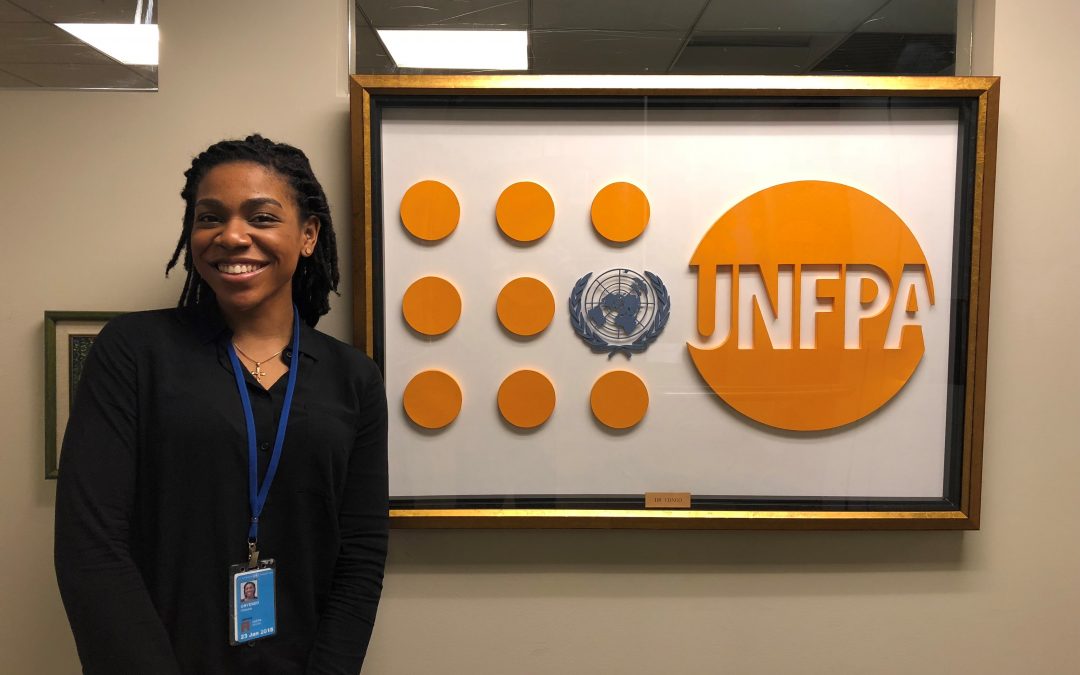
by Madison McHugh | Feb 7, 2018 | Graduate Students, Internship Experiences
My name is Chiazam Onyenso, and in my final semester within the Master of Arts program in International Relations and Diplomacy, multiple experiences have driven my current desire to continue my academic pursuits as they pertain to international affairs. My interest in collaborative international agencies reflects the internship I’ve committed myself to at the United Nations Population Fund.
My first-year M.A. studies mainly observed the nature of conflict, theories on the correspondence of the international community, resolutions and the management of international institutions that all catalyzed my eagerness to work for the United Nations. As a humanitarian information management intern for its Humanitarian and Fragile Contexts Branch (HFCB), working with the United Nations Population Fund (UNFPA) provided me with relevant knowledge on the effects of crises and the various avenues utilized by UN agencies to provide relief to affected populations and to address critical international issues. I developed exceptional skills in internal correspondence, analyzing and visualizing data, and reporting on fast-paced crisis situations in real-time. My assignments required background knowledge on humanitarian crises along with nurturing a strong understanding of UNFPA’s gender-based violence and health services for youth and women in conflict.
My experience as a UNFPA intern made me increasingly interested in staying with agency, in order to continue learning more on how it functions to fulfill its mandate and begin my career. Since last July, I have assisted HFCB in creating fact sheets, developing situation reports and analyzing information that will gradually populate UNFPA’s newly launched data portal, and the upcoming Humanitarian Action Overview for 2018. At the UNFPA, my work has been greatly complemented by the skills and knowledge I’ve procured through my master studies. Specializing in International Organizations, Global Negotiation and Conflict Management, while also earning a certificate in Post-Conflict Reconstruction and Sustainability has contributed to my understanding of UNFPA’s role and overall humanitarian response. Most of all, I’ve recognized the most crucial capacities of international assistance and aid rely on sound international law.
I hope to broaden my experience in international relations in line with international law. Adequate response to affected populations and vulnerable groups across the globe depends on human rights policy and effective rule of law; essentials that have been made incredibly clear to me at UNFPA.
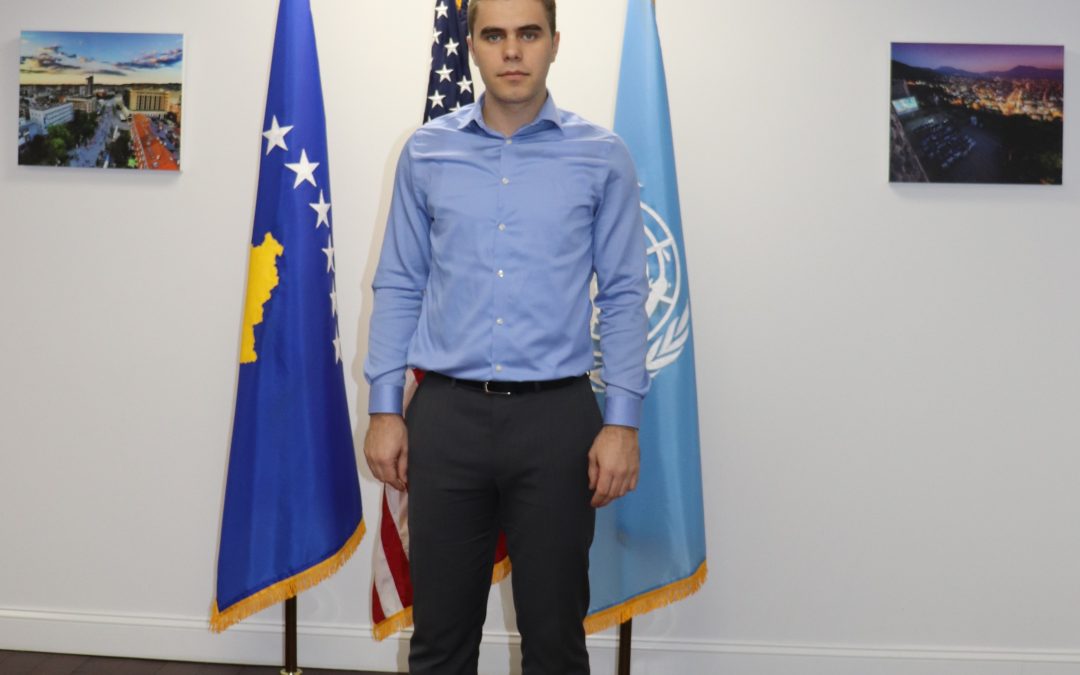
by Madison McHugh | Jan 24, 2018 | Graduate Students, Internship Experiences
My name is Lis Kabashi, and I am studying International Relations and Diplomacy at Seton Hall University. I come from a city called Mitrovica, which is located in the northern part of Kosovo.
I interned at the Consulate General of the Republic of Kosovo. In contrast to other Consulates, the Consulate General of Kosovo serves a dual purpose. Apart from serving its citizens in the US, the Consulate General also serves as a lobbying ‘mission’ to the UN, seeking more recognition for the Republic of Kosovo.
I decided to intern at the Consulate General of the Republic of Kosovo because in the future I would love to work as a diplomat for my country in one of our Embassies around the world. As the number of countries that recognizes Kosovo has gone up to 114, new Embassies and Consulates are opening up around the world. Thus, demand for experts in international relations and diplomacy has increased. For me, the experience at the Consulate General is a very important first step towards that goal.
My intern duties at the Consulate varied. For example, I prepared news analyses and reports on current events related to the Republic of Kosovo. Such analyses and reports served the purpose of informing the Ministry of Foreign Affairs in Kosovo.
During the UN General Assembly 2017, the Consulate received two High-Level Delegations: Presidential and the Ministry of Foreign Affairs. Along with another intern, I led the efforts in putting together files for each meeting that took place. These files, intended for the Chief of Cabinet for each delegation, consisted of brief biographies and resumes of each High-Level leader. Since most of our classes at the School of Diplomacy require us to learn about foreign policy decision makers from countries all over the world, I think that this is one of many ways how my internship related to my classes at the School of Diplomacy.
The opportunity to work at the Consulate was not only a period in which I learned about diplomacy – it was instrumental in building my professional network. Over two months, I had the honor of meeting Ambassadors and diplomats from various countries and attending functions hosted by different missions at the UN. Almost all of the diplomats that I met shared some of their experience and knowledge with me. Thus, I have learned how to think as a diplomat as well as how leaders protect the interests of their countries.
I recommend the internship to those who are interested in having a career in diplomacy. Apart from meeting key decision makers from all over the world, an intern at a Consulate could also improve their written and verbal communication skills, which are key to becoming a successful diplomat.
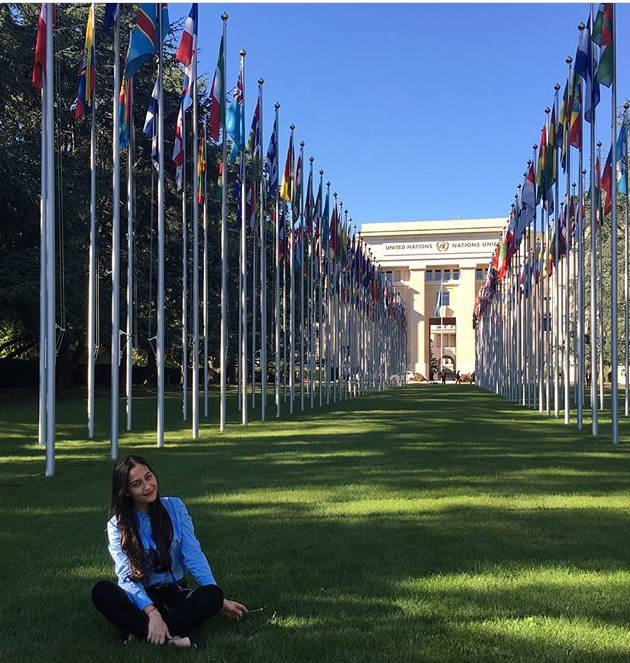
by Madison McHugh | Oct 4, 2017 | Graduate Students, Internship Experiences
My name is Isabel Deluna, and I am a Diplomacy student at Seton Hall. Switzerland was wonderful: being surrounded by multilateral organizations and diplomats from all over the world made my internship at the Dominican Republic Mission to the UN very interesting. Over the summer, a new Ambassador to the Dominican UN was chosen, and I spent much of my time preparing for his arrival by renewing and updating systems and archives.
At the mission, my primary responsibility was to prepare two types of reports for the Minister of Foreign Affairs at the Dominican Republic following UN meetings. We reported verbal notes for the United Nations to notify of activities or requests, as well as “oficio” reports, which were special reports sent to the Dominican Republic to inform the Ministry of Foreign Affairs of mission developments and changes in events or circumstances. I prepared each report with the information provided and entered them into the record system. Everything at the mission must be put on their record, and the reports were vital to fulfilment of the mission. In addition, I frequently assisted during United Nations sessions and meetings with Dominican Republic participants, helping active participants and observers alike.
I believe the internship helped me to build my professional network. I met a great many Ambassadors and diplomats from multiple missions in Geneva who shared their experiences with me and made recommendations on strategies for my future career. I believe it is important to know the missions’ systems as well as how they manage their representation at the United Nations.
I attended sessions that related to a variety of important topics, including migration, human rights, and indigenous groups. The sessions had a great impact on me, because I was able to see the way diplomats interact with each other and express concern and defend certain topics for the benefit of their respective countries. I feel I gained an understanding of their knowledge and strategies, and thus I learned how to think strategically and manage my expression of my opinions. I believe I can apply much of what I learned in future classes and discussions.
Throughout my internship, I gained skills that will help me ascertain my position on topics of importance as well as maintain and defend it, which amplifies my ability to analyse problems and situations on diverse topics. I am very grateful I was given the opportunity to improve my skills in a direct, diplomatic setting, and I would especially recommend the internship to those who are interested in the UN!








